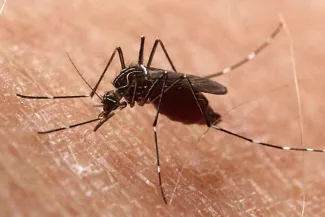
EarthTalk - What are some all-natural ways to control insects and rodents?
© iStock
Dear EarthTalk:
What are some all-natural ways to control insects and rodents?
P.L., Trenton, NJ
Natural pest control has become increasingly popular given the slew of health and effectiveness issues with conventional pesticides derived from synthetic chemicals. Since synthetic pesticides became popular after World War II, toxic chemicals have infiltrated nearly 90 percent of U.S. waterways. According to the U.S. Centers for Disease Control and Prevention (CDC), Americans carry around some 43 different pesticides in their bloodstreams. These chemicals can trigger a wide range of symptoms, like nausea, vomiting and headaches, and cause bigger health problems like lung damage, cancers and reproductive issues. These pesticides are especially dangerous to kids, who are typically less resilient to the chemicals. Out of all the cases of pesticide poisoning in the U.S., around half are in kids under the age of six.
And these pesticides aren’t always 100 percent effective. They often can’t get rid of entire infestations as they are unable to target pests at every stage of their life. A pesticide might target adult fleas but not be able to target flea eggs. In some instances, pesticides can make issues worse, like spurring ant colonies to divide into multiple colonies and increase reproduction. Bugs can also grow resistant to certain pesticides.

Experts think the benefits of using DEET-based bug repellent to scare off mosquitoes and other biting insects outweigh the health and environmental risks. Credit: Laurie Wilson, FlickrCC.
So, what are some other options to deal with pests besides spraying toxic chemicals? One strategy, integrated pest management (IPM), focuses on preventing infestation before it starts and only uses pesticides as a last resort. The main tenets of IPM include preventing vermin from entering the home, keeping the home clean, picking your battles by only killing dangerous bugs, and going green by killing or trapping pests without using pesticides.
There are a few natural pest repellants that you may have already in your home. Dish soap can keep ants away and be sprayed where ants have been seen in your house. Lime and lemon juice keep spiders away, and salt can get rid of fleas. Vinegar also works well at keeping away many types of pests, including ants, fruit flies and mosquitos. Mixing vinegar with an orange peel, tea tree oil or lemon rind oil will make it even stronger. But if you already have a major infestation in the home, these remedies usually won’t make them go away. These are more preventative measures to stem the chances of pests infiltrating your home.
Finding effective natural repellents on the market can be tough. Natural repellents that avoid synthetic chemicals and instead use active ingredients like lemongrass or rosemary oil are regulated differently than other repellent products. Because the U.S. Environmental Protection Agency (EPA) deems the chemicals used in natural repellents harmless, they do not test them for effectiveness. This loophole allows companies that sell natural repellents to avoid needing to prove that their product actually works. There are plenty of ways to limit pesticide use, and natural ingredients are a great option to prevent pests from entering your home. However, when looking for “natural repellants” on the market, be sure to do your research to be sure what you are buying will actually work.
CONTACTS
- Control Household Pests Without Scary Poisons, https://www.nrdc.org/stories/control-household-pests-without-scary-poisons
- 9 Best Natural Pest Control for Bugs, Rodents, and More, https://www.grove.co/best/natural-pest-control
- Using spiders as environmentally-friendly pest control, https://www.sciencedaily.com/releases/2023/02/230216172211.htm
- 10 Natural Pest Control Remedies for Your Home, https://www.familyhandyman.com/list/natural-pest-control-remedies-for-your-home/.
EarthTalk® is produced by Roddy Scheer & Doug Moss for the 501(c)3 nonprofit EarthTalk. See more athttps://emagazine.com. To donate, visit https://earthtalk.org. Send questions to: question@earthtalk.org.















